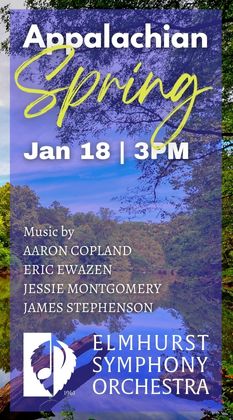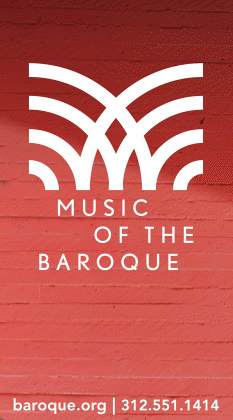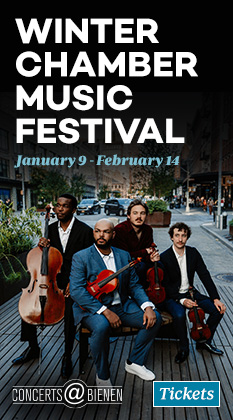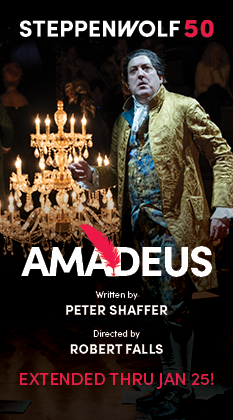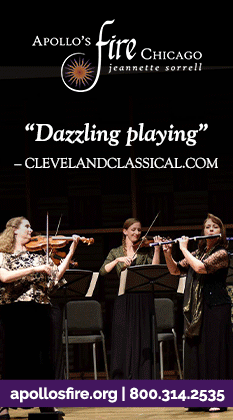Dover Quartet opens Winter Chamber Fest in top form with “American” program
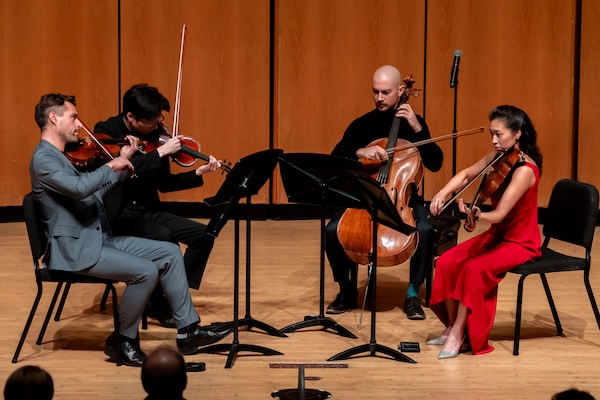
Northwestern University’s Winter Chamber Music Festival feels like a balm each January. As the temperatures linger below freezing, the days remain begrudgingly short, and most of the city’s performing arts organizations wait until closer to February to resume business as usual, one can reliably count on the three weekends of outstanding chamber music at the Evanston campus immediately after the new year.
The vaunted Dover Quartet kicked off the 2025 festival Friday night at Pick-Staiger Concert Hall. Quartet-in-Residence at both Northwestern’s Bienen School of Music and Curtis (where they formed in 2008), the Dover is one of this year’s headliners, and the exceptional treatment they gave their program, which investigated different angles of American music, made clear why they have established themselves as one of the world’s preeminent quartets.
Jessie Montgomery’s seven-minute Strum served as an overture. Strum proceeds in episodic sentences, organized by what Montgomery calls “texture motives,” repeated cells or sonorities that support its varied melodies. The work begins with bardic pizzicati from the viola and second violin before launching with an elegiac melody from the cello. Faster, modal passages suggest a bluegrass groove, and some more lush moments evoke Barber, but always with Montgomery’s idiomatic spin. The Dovers—violinists Joel Link and Bryan Lee, violist Julianne Lee, and cellist Camden Shaw—were fully in sync with the brief work’s style and pivots.
The focus of Friday’s program was the quartet’s collaboration with Jerod Impichchaachaaha’ Tate, a composer of the Chickasaw Nation whose work channels “the ethos of Native American culture” in a Western classical context. Tate was on hand Friday (returning to his alma mater, having earned a piano degree from Northwestern in 1990) to elucidate his influences and heritage in an engaging lecture-demonstration.
Tate wrote Abokkoli’ Taloowa’ (Woodland Songs) for the Dover Quartet last year, and the group spent the first part of the week recording it in Philadelphia under the composer’s guidance. Each of the piece’s five movements portrays a forest animal sacred to the Chickasaw people. It is a complex work of depth and gravitas, depicting not your Disney Bambi cuddlies, but the profound spiritual significance of these animals for the originally forest-dwelling Chickasaw.
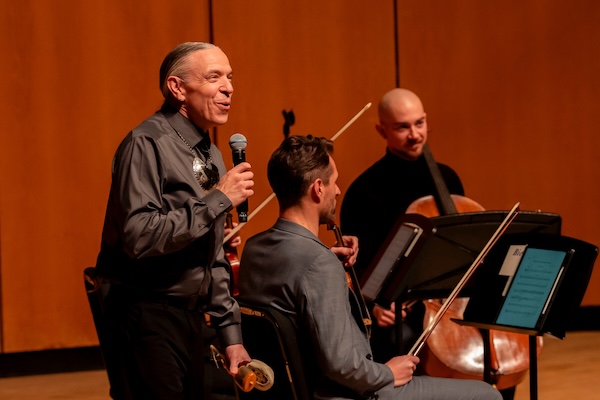
A precipitous scampering runs throughout the opening “Fani’ (Squirrel),” and “Bakbak (Woodpecker)” swirls fleetly. The central “Issi’ (Deer)” captures the creature’s serene nobility, with a Native melody in crunchy dissonances toward the end. “Nanni’ (Fish)” captures the shimmering of scales and water, and the final “Shawi’ (Racoon)” concludes with a vigorous war dance.
Each movement is highly evocative, and there are memorable textures with Native strains unfolding over intricate accompaniments. At almost half-an-hour though, Woodland Songs feels overlong, and by the end a self-similarity prevails. In each movement, skittering busyness gives way to a soaring tune enough times that it starts to feel like a gimmick. Nonetheless, there is much ingenious writing, and with the Dover’s sensitive advocacy Woodland Songs still makes an impact, albeit one that could benefit from some judicious pruning.
Friday’s first half ended with Rattle Songs, a 2024 transcription Tate made of seven short songs written for the vocal ensemble Ulali by Pura Fé, herself a Tuscarora singer. Dover cellist Camden Shaw grew up listening to the Ulali album Mahk Jchi, and asked Tate to arrange some of its songs when he learned of their shared admiration for that record.
Rattle Songs amounts to seven brief miniatures abounding with Native folk influences. Transparent close harmonies shone with the Dover’s immaculate intonation and alternated with more bluesy numbers redolent with lurching slides. As with Woodland Songs, by the end the suite begins to feel predictable, but Tate’s translation from vocal writing to string quartet is convincingly accomplished.
The Dovers devoted the second half to Dvořák’s “American” String Quartet in F Major, Op. 96, written during the Bohemian composer’s famed 1893 summer in the Czech community of Spillville, Iowa (well worth the five-hour drive for Dvořák and music history fans). The Dover Quartet is often compared to their august Curtis forebears the Guarneri, and their bracingly fresh Dvořák performance made the comparison apt. They had a clear vision of Dvořák’s score, one that emphasized its unsettled agitation in a way that let one hear this well-worn work anew.
Violist Lee, who will be leaving the Dover Quartet at the end of the present season to return to the Boston Symphony Orchestra, launched the Allegro ma no troppo with its bounding melody, and the movement unfolded with nervous, kinetic energy. Link and Shaw brought pathos to the keening spiritual lament of the Lento, and the Molto vivace went with elevated elan. While lesser groups may settle for a freewheeling romp in the Finale, the Dovers collectively brought out the movement’s enormous harmonic variety, making the case for their fresh, idiosyncratic reading.
The Northwestern Winter Chamber Music Festival continues Saturday with Third Coast Percussion joined by Jessie Montgomery in Jlin’s Please Be Still, Montgomery’s Lady Justice and Suite from In Color, Tigran Hamasyan’s Sonata for Percussion, and Lou Harrison’s Concerto for Violin and Percussion with Montgomery as the soloist. music.northwestern.edu
Posted in Uncategorized
